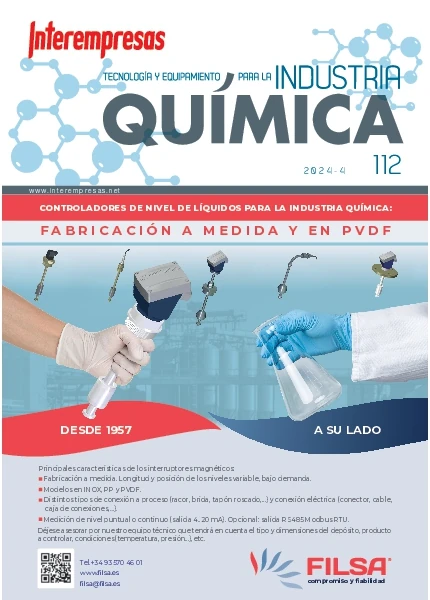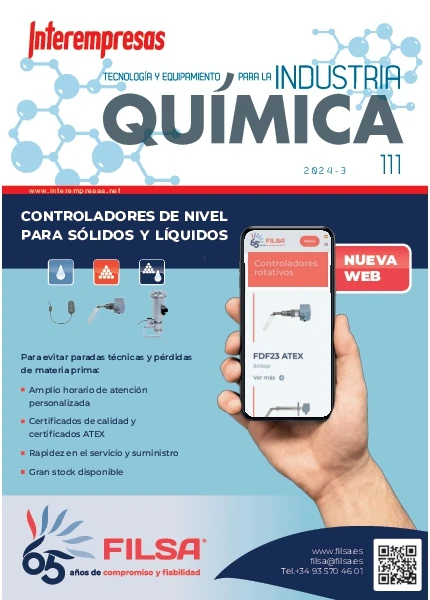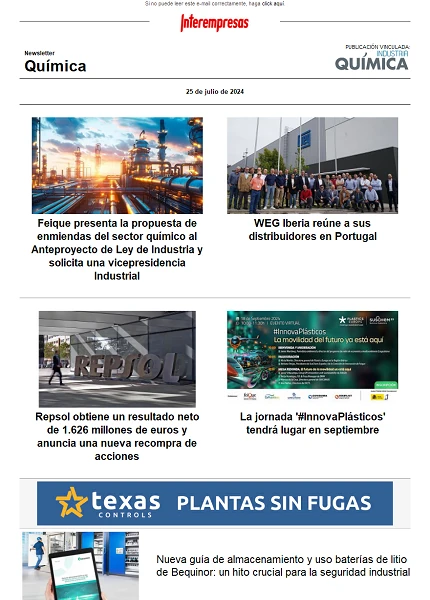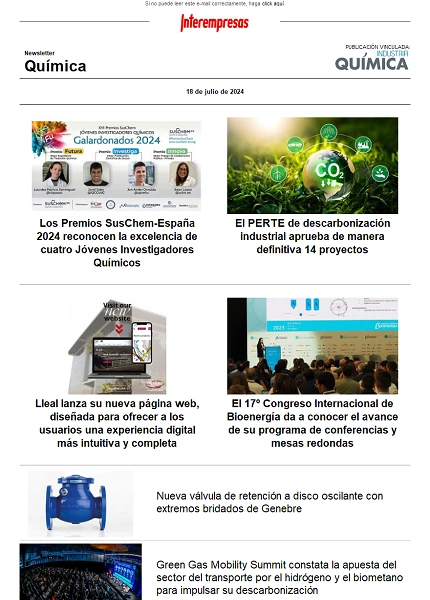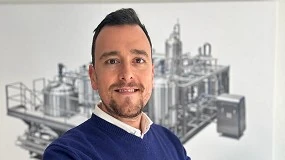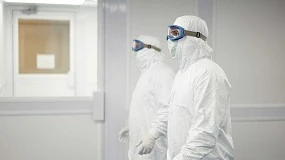Interview with Josep Maria Monfort, Director General of the Irta
October 30, 2008
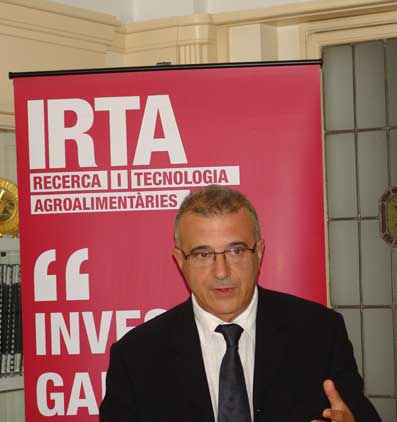
What was your first impression as the new director of the Institute?
Enter in the direction general de Irta has been to make full contact with the real dimension and power it has and represents the Irta in the food world, with sweeping relations we maintain with institutions both own Irtaresearch centres, Governments and enterprises of our country and around the world.
Our scientific capacity and structure of centres and experimental stations and associated centres form a network of technology that covers almost all areas of the agro-food sector and allows us to establish synergies which translates into an enormous potential and research capacity with specialists in each area of work. Our strength lies in the combination of the two and makes it possible to maintain a research service for the sector and society characterized by the excellence of the work we perform for companies and administrations, both nationally and internationally.
Do you think that administrations are engaged enough with the r & d in the agri-food field at the national level?
Clearly not. The weight of research arising from national funds is a true reflection of the invisibility of the agri-food sector has until now. The agri-food sector is the first industry in the Spanish market and seems invisible. We have had to meet a situation of shortage of raw materials and exorbitant prices as a result of speculation in futures markets to revisualizar the importance of the agri-food industry of our country. Hopefully the current concept will continue and will be reflected in that part of the national plans of research and development of the agro-food area.
In his view, is our country research competitive?
In research, are a very competitive country as indicated by the ratios of publications of our researchers in scientific journals that place us in a very high level. The problem is of transfer, i.e., of how this knowledge goes beyond the mere circle of scientific publishing.
What do you think animal cloning and genetically modified food? What is the philosophy of the Irta thereon?
With regard to the issue of cloning for food production, the European Commission has already ruled on the same as a technique not suitable for this purpose. Our institution will do more than support such a conclusion and the scientific evidence in this regard there are.
On the issue of GMOs, the position of the Irta is also clear and is based on the same legal and scientific principles to the case of cloning, although in this case the European food safety agency has given a report favourable to its use and has the support of organizations such as Fao or the WHO, among others.
What is the implication of the Irta with animal welfare?
On issues of animal welfare Irta has been working in various projects on the welfare of the animals on farm, during transport and at slaughter. In this regard, research on animal welfare that are already made will be expanded with the recent acquisition of an experimental farm in the Lleida town of Alcarràs and which is expected to spend an exclusive space for its research.
And with the environment?
Also, we dedicate a remarkable effort in many areas. First we have a consorciado Centre as the Giro CT (Integral management of organic waste), is which works exclusively this theme to minimize the impact of agroganaderas activities on the environment. We also dedicate efforts in research through our unity of aquatic ecosystems, which have specialized in issues such as the River ecology or the recovery of species in danger of extinction. Finally, there are other centres which, although they are not as specialized as the above mentioned, do work on aspects relating to the environment. This is the case, to give some examples, research on biofuels from grain, oilseeds or algae, or studies for the organic fraction of household waste composting.
Vegetables, vegetables and fruit today provide a superb look, however, its taste is not what was. Why?
Logistical requirements for the marketing of these products require to make early collections in which the vegetable or fruit has not been long enough in the plant or tree, and hence that flavor may suffer. On the other hand, current consumers, in general, prioritized over an impeccable product presentation than its taste. This is a route that should take advantage of local products that can bid both qualities, i.e., good presentations of product and immediacy from his collection until you reach consumers.
On the other hand, are the research to be able to offer more coverage in the degree of conservation of plant foods, either through new treatments post-harvest, either through design of new packaging and protective atmospheres. This is an area of which Irta devotes many efforts and researchers and research that can contribute to improving this aspect.
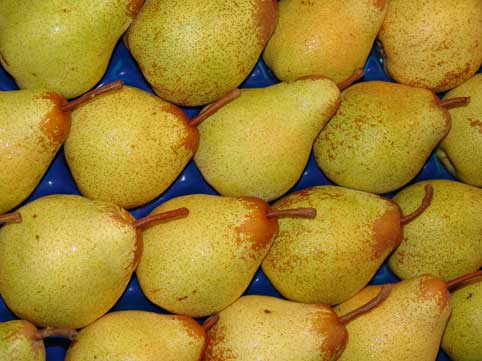
Of all the studies conducted by the Center this year, what I would highlight? Why?
It is a question difficult to answer because in the Irta we are carrying out more than 250 research projects a year. Perhaps I would more than studies highlight the most immediate projects that we intend to carry out, as it is the case of the Fruitcentre, which will be devoted to research in the string value of the fruit, since items genetic, agronomic, crop and post-harvest, presentation, valorisation of by-products, etc. New experimental station, to which we could add in the expansion of our Center of aquaculture, the Experimental Station of the Ebro, or Torre Marimón in Caldes de Montbui, future site of the Irta or which will be hosting a part of the UAB Research Park. Also noteworthy are the start of construction of the Centre for research in Agrogenómica CSIC-Irta-UAB-UB in the Bellaterra Campus or the workshop of Experimental cuisine that we open at the end of this month in Gimenells (Lleida).
What is the main project in food from the Center for 2009?
There are a large number of research projects, to which more food, interesting, and which affect both the commercial offer of products and its presentation. To highlight any of them would indicate the work being carried out in conservation fresh beef (ProsafeBeef), of the production of hams with low salt content (Truefood), the study of the sources of contamination in raw meat chopped and prepared meat, the application of nanotechnology in food, new technologies of production and processing of food for the obtaining of new foods or the improvement of their processing, storage and cryopreservation (Zenith-Futural) or obtaining of salted, marinades, marinated and pâtés based on sardines, among others.
These are just some examples of our frenetic activity in the agri-food field and that they be translated in the near future in new presentations or ranges of food to consumers.
And the main agricultural project?
One of the most relevant projects which are carried out in the agricultural field is the so-called Fruit Futur, an economic interest grouping consisting of four entities (Actel, Nufri, Poma of Girona, and Fruits of Ponent) and Irta, as a technology partner. Established in 2003 is aimed to obtain new varieties of Apple, pear, peach and Nectarine, adapted to local production conditions.
This group works in two lines of research, one for the collection of seeds of new varieties of Apple and PEAR, by agreement with HortResearch's New Zealand, and the second, to obtain new varieties of peaches and nectarines, jointly with ASF. It is an ambitious project that is find varieties that primarily please the consumer. Since its inception, the project has been working with 100,000 varieties of fruit from them which only 10 or 20 will be which will thrive and coming to the market. In addition, this project has a direct link with the Fruitcentre to be held in the Park of Gardeny, Lleida, who is also seeking to sector East all investigations to be carried out around the chain of values of the fruit.
It is planned that the first varieties of peaches and nectarines to initiate his marketing from the 2009-2010, and those of Apple and pear from 2011-2012.
What are the challenges for the future of the Irta in the coming years?
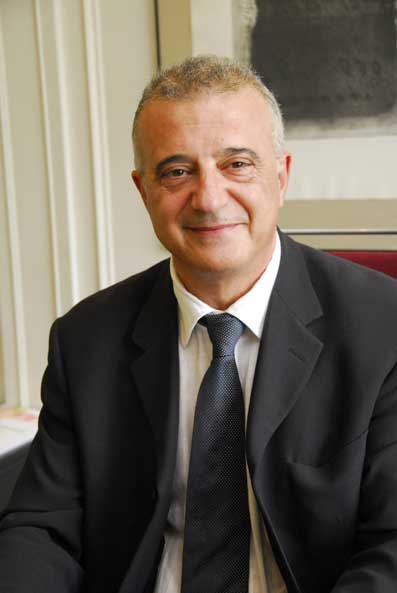
Whether we are talking about in the short, medium or long term, the first thing to do is overcome the current economic crisis without losing talent. In other words, without losing what is our capital, and that is none other than the human capital, seen as intellectual capacity. It is our greatest asset and that we must maintain in order not to lose scientific capacity.
On the other hand, we must consolidate as an element of reference in the sector, which should see us as your technology partner. We think companies, producers, cooperatives and processing industries, when they think of research and innovation, in the Irta.
The third challenge is that of our internationalization. We have to be present outside as a means to absorb technology, new ideas and generate technological dependence.
Profile
Josep Maria Monfort (born 1954) holds a PhD in sciences by the Universitat Autònoma de Barcelona, researcher A + of Irta and, until the present time, Director of the field of technology of the food of the Irta. Director of the reference network at technology in the food of the Generalitat de Catalunya, Director-coordinador of the network State Center competition in transformed meat products, Vice President first Board of Trustees of the Foundation Centa-Technology Centre (Center of new technologies and processes food), representative of the Irta in the directive Board of the Consortium Safe, Member of the Rector Council of platform Spanish Food for Life, scientific coordinator of the zenith Futural and Vice-Investigador main Consolider Carnisenusa project. It has also been a professor at the Universitat Autònoma de Barcelona, the Universitat de Barcelona and is currently Professor of the Universitat de Girona. He has collaborated in masters courses with 11 Spanish universities and is the author of more than 100 articles and scientific papers.


